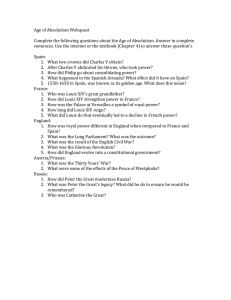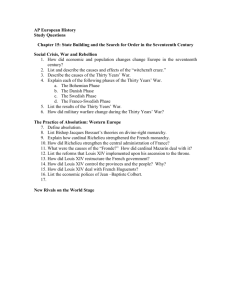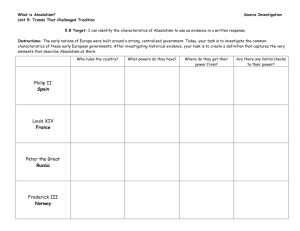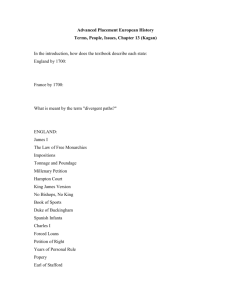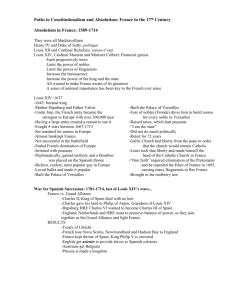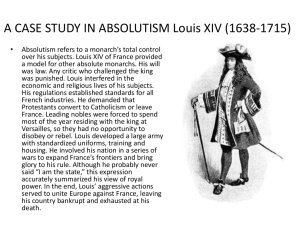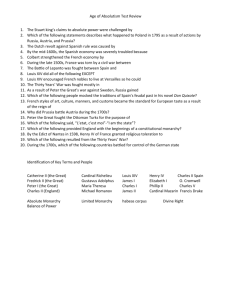Age of Absolutism: King Louis XIV
advertisement
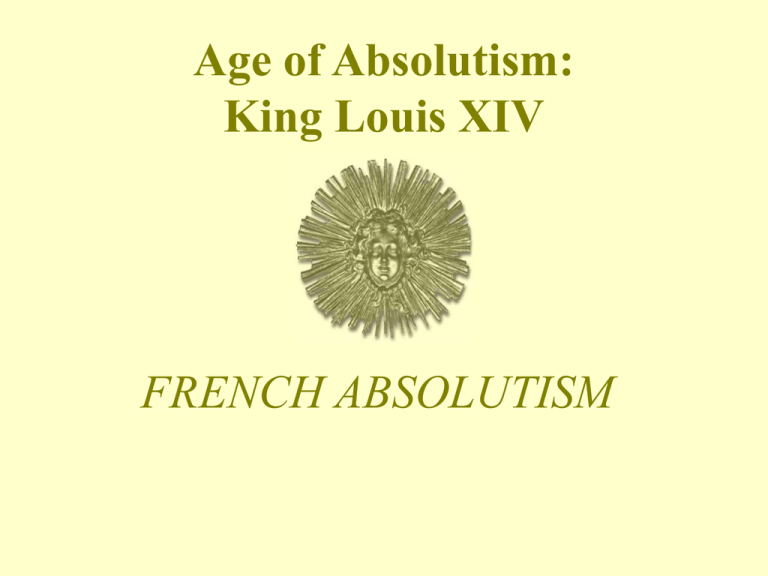
Age of Absolutism: King Louis XIV FRENCH ABSOLUTISM Absolutism • Political theory that believed in the “Divine Right of Kings” (Monarchs received their authority from God). • Bishop Bossuet established this in Politics Taken From the Very Words of Scripture. Bishop Jacques Bossuet Absolute Monarchy in France • Foundations of French Absolutism – Cardinal Richelieu (1624 – 1642) • Policies and goals • Administrative reforms – Cardinal Mazarin (1642 – 1661) • The Fronde – Noble Revolt • Both were able to maintain power because they acted as regents for very young kings Louis XIV (r. 1643-1715) • Personal rule began in 1661 with the death of Cardinal Mazarin. • "L'État, c'est moi" (the state is me) • Symbolized as the “Sun King.” (Center of France; rays of sun reflect off of monarch onto subjects). Châteaux de Versailles • King’s residence and center of government. • Spent vast sums of money on expansion. • Royal apartments were at the center of the complex. Court Life at Versailles • King severed dual functions: that of courtier and that of administrator. • Both functions were aimed at state-building. • The Fronde had taught Louis to distrust the nobility, so he appointed officials from middle-class origin. • He also continued the practice of selling titles (“nobles of the robe” as opposed to “nobles of the sword”). Jean-Baptiste Colbert (1619-1683) • Served as controller of finances from 16621683. • Supported mercantilist policies. • Built roads and canals. • Credited for many of Louis’ economic successes and failures. Domestic Policies • Louis enacted absolutist ideas through domination of the central bureaucracy which had greater control of state finances, the execution of laws and the use of armed force. • Increased royal control over the local parlements. • Defended the policy of Gallicanism. • Revoked the Edict of Nantes in in October 1685 and began persecuting Huguenots; over 200,000 fled France. Wars & Expansion under Louis XIV • Through a series of expensive wars Louis slowly expanded French territory. • War of Devolution (1667-68) • The Dutch War (167278) • War of the League of Augsburg (1688-97) War of Spanish Succession • Childless Hapsburg Charles II names Bourbon Philip of Anjou as heir. • England, Holland and HRE oppose French acquisition of Spain & territories. • Louis was defeated by the British and Austrians. Treaty of Utrecht (1713) •War ended with Treaty of Utrecht (1713) and Treaty of Baden and Rastatt (with Hapsburgs in 1714) •Philip of Anjou become Philip V of Spain, but he nor his successors could hold French throne. •Hapsburgs and British gained territory, French lost New World lands. The End of an Era • Louis XIV was one of the great statebuilders of Europe • Despite this, the peasants of France suffered as they never had before or since. This would bring government welfare as a state function in the 18th century • His absolutist policy solidified the place of France as the dominant power in Europe. The Decline of Spain • Appearance vs. Reality – Spain controls large parts of the New World, Asia and Africa and has trade routes between them – appears to be rich and powerful – Actually, the treasury is empty, the armed forces are out of date, government is inefficient, commercial class is weak, peasants are suppressed and there are too many nobles and priests • Bankruptcies in 1596 and in 1607 under Phillip II and Phillip III Decline, continued • Under Phillip III (15981621) it becomes apparent • Phillip IV tries to revive Spain – Gaspar de Guzman, Chief Minister • Attempts to centralize the government – Domestic reforms – Curtail power of Catholic Church and Aristocracy – Bring governments of possessions under control Outcome in Spain • Attempts to centralize government are unsuccessful – Thirty Years War • Expensive military campaigns • Total defeat at the Battle of Rocroi (1643) – Internal Revolts/Civil War – Dutch Independence formally recognized by the Peace of Westphalia (1648) – Spanish Netherlands and outlying areas lost in Peace of the Pyrenees (1659)
